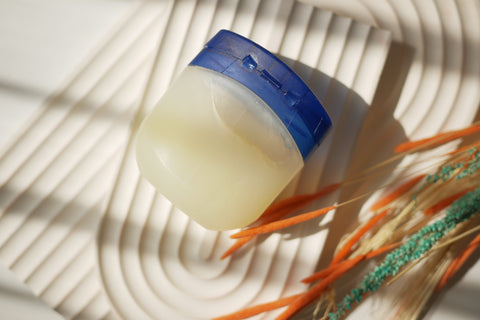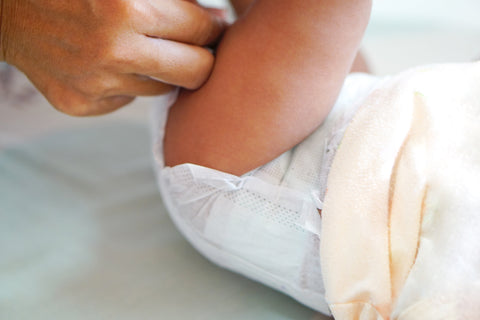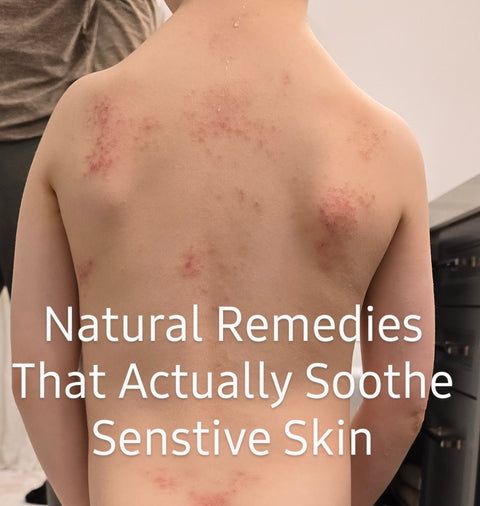Should You Use Petroleum Jelly on Your Baby? A Cleaner Alternative
You’ve probably had a jar of petroleum jelly in your nursery since day one—just like your mom did. It’s marketed as a baby care essential. But is it actually safe for your baby’s delicate skin?
The short answer: not always. While petroleum jelly may help lock in moisture, many parents are surprised to learn it doesn’t actually heal the skin—and in some cases, it can make things worse.
In this post, we’ll explore what petroleum jelly really is, why it’s been used for generations, and why more parents are turning to clean, plant-based alternatives for everyday baby care.
🧪 What Is Petroleum Jelly and Why Is It So Common?
Petroleum jelly, often listed as petrolatum or mineral oil, was discovered in the 1800s as a byproduct of oil drilling. It quickly became popular in medicine cabinets for its ability to coat and seal the skin, creating a moisture barrier.
In baby care, it’s commonly used for:
- Diaper rash protection
- Dry skin patches
- Eczema flare-ups
- Minor cuts or scrapes
It’s inexpensive and widely available—but that doesn’t mean it’s the best choice for your baby’s skin.
⚠️ Is It Actually Safe for Babies? The Hidden Concerns
❌ It traps moisture and bacteria
Petroleum jelly forms a waterproof seal over the skin. While this can prevent moisture loss, it also prevents the skin from breathing and traps in sweat, bacteria, and irritants—especially problematic in the diaper area.
❌ It doesn’t nourish the skin
Unlike natural oils or butters that contain skin-supportive nutrients, petroleum jelly simply sits on the surface. It doesn’t calm, repair, or restore the skin barrier.
❌ It may contain harmful contaminants
When not fully refined, petroleum jelly can contain PAHs (polycyclic aromatic hydrocarbons), which are linked to cancer. In Canada, petrolatum must meet safety standards—but not all brands disclose refinement methods.
The Environmental Working Group (EWG) gives some petroleum-based baby products low safety scores, especially for use on broken or sensitive skin.
🌿 Why Parents Are Switching to Petroleum-Free Alternatives
Today’s parents are more informed. They're reading ingredient labels and choosing cleaner baby products. Especially when it comes to newborn skincare, every ingredient matters.
Natural alternatives do more than just protect—they nourish and heal the skin.
Look for formulas made with:
- Plant-based oils like castor, apricot kernel, or sunflower
- Natural waxes like berry wax to form breathable barriers
- Vitamin E and botanical extracts to calm inflammation
- Fragrance-free or low-scent options for ultra-sensitive skin
👶 What to Use Instead: A Better Way to Protect Baby Skin
Barrier protection is important—especially for preventing diaper rash, soothing eczema, or calming dry spots. But it doesn’t have to come from petroleum.
Mamou’s Baby Barrier Gel was created as a petroleum-free alternative for parents who care about what touches their baby’s skin.
Formulated with:
- Berry Wax — a breathable, plant-based alternative to petroleum
- Castor and Sunflower Oils — rich in fatty acids that soften and protect the skin barrier
- Apricot Kernel Oil — anti-inflammatory and deeply moisturizing
- Tocopherol (Vitamin E) — a natural antioxidant that protects and restores
Gentle enough for newborns. Effective enough for toddlers with sensitive or rash-prone skin.
💬 “I was looking for a cleaner, safer alternative to baby Aquaphor when I stumbled upon this magic in a bottle!!!” – Lola K., second-time mom
💡 Gentle Protection Shouldn’t Come at a Cost
Petroleum jelly may be familiar—but it’s no longer the gold standard. With increased awareness and a push for transparency, more families are choosing skincare that is safe, effective, and naturally supportive.
Your baby’s skin deserves better—and we’re proud to help raise that standard.
📣 Try Mamou’s Baby Barrier Gel: Petroleum-Free Protection for Your Little One
Looking for a clean, nourishing alternative to traditional barrier creams?
👉 Shop Mamou’s Baby Barrier Gel now →
- ✨ Safe for newborns
- ✨ Free from petroleum, sulfates, phthalates, and parabens
- ✨ Made with love by moms, for moms
Disclaimer: This blog is for informational purposes only and does not substitute medical advice. Always consult your pediatrician before trying new products, especially on sensitive or broken skin.




